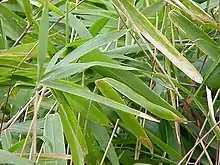| Arundinarieae | |
|---|---|
 | |
| Arundinaria pumila | |
| Scientific classification | |
| Kingdom: | Plantae |
| Clade: | Tracheophytes |
| Clade: | Angiosperms |
| Clade: | Monocots |
| Clade: | Commelinids |
| Order: | Poales |
| Family: | Poaceae |
| Clade: | BOP clade |
| Subfamily: | Bambusoideae |
| Tribe: | Arundinarieae Asch. & Graebn. (1902) |
| Subtribe: | Arundinariinae Nees ex Lindl. (1836) |
| Genera | |
|
30 genera, see text | |
| Synonyms[1] | |
| |
Arundinarieae is a tribe of bamboo in the grass family (Poaceae) containing a single subtribe, Arundinariinae, and 31 genera.[1] These woody bamboos occur in areas with warm temperate climates in southeastern North America, Subsaharan Africa, South Asia and East Asia. The tribe forms a lineage independent of the tropical woody bamboos (Bambuseae) and the tropical herbaceous bamboos (Olyreae).[2]
Genera
- Acidosasa
- Ampelocalamus
- Arundinaria
- Bashania
- Bergbambos
- Chimonobambusa
- Chimonocalamus
- Drepanostachyum
- Fargesia
- Ferrocalamus
- Gaoligongshania
- Gelidocalamus
- Himalayacalamus
- Indocalamus
- Indosasa
- Kuruna
- Oldeania
- Oligostachyum
- Phyllostachys
- Pleioblastus
- Pseudosasa
- Sarocalamus
- Sasa
- Sasaella
- Sasamorpha
- Semiarundinaria
- Shibataea
- Sinobambusa
- Thamnocalamus
- Vietnamocalamus
- Yushania
References
- 1 2 Soreng, Robert J.; Peterson, Paul M.; Romaschenko, Konstantin; Davidse, Gerrit; Teisher, Jordan K.; Clark, Lynn G.; Barberá, Patricia; Gillespie, Lynn J.; Zuloaga, Fernando O. (2017). "A worldwide phylogenetic classification of the Poaceae (Gramineae) II: An update and a comparison of two 2015 classifications". Journal of Systematics and Evolution. 55 (4): 259–290. doi:10.1111/jse.12262. hdl:10261/240149. ISSN 1674-4918.

- ↑ Kelchner S, Bamboo Phylogeny Working Group (2013). "Higher level phylogenetic relationships within the bamboos (Poaceae: Bambusoideae) based on five plastid markers" (PDF). Molecular Phylogenetics and Evolution. 67 (2): 404–413. doi:10.1016/j.ympev.2013.02.005. ISSN 1055-7903. PMID 23454093. Archived from the original (PDF) on 2015-06-05. Retrieved 2015-07-25.
This article is issued from Wikipedia. The text is licensed under Creative Commons - Attribution - Sharealike. Additional terms may apply for the media files.